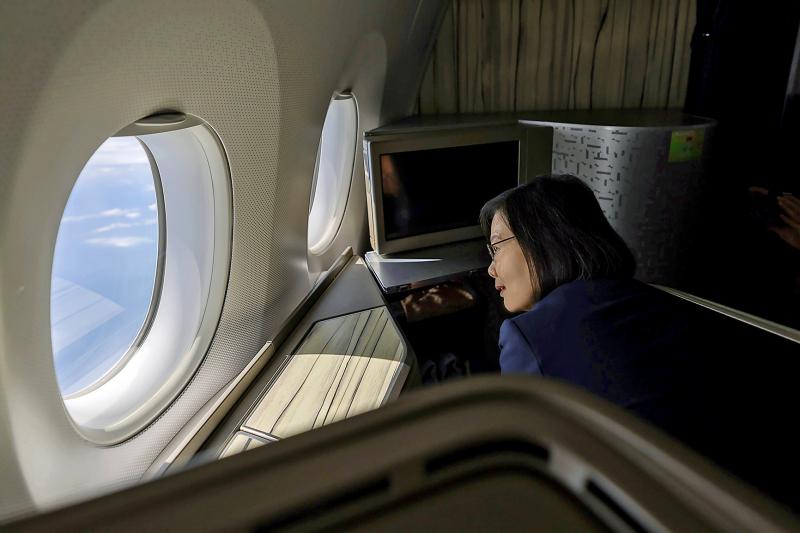President Tsai Ing-wen (蔡英文) yesterday said that she is visiting the Kingdom of Eswatini to celebrate the diplomatic relationship between Taiwan and the African country, and promote sustainable cooperation.
“Eswatini has always taken a stand in staunch support of Taiwan, giving us confidence and strength to continue contributing to the world,” Tsai said at Taiwan Taoyuan International Airport before leaving on a four-day trip to the African nation.
This year marks the 55th anniversary of Eswatini’s independence and the diplomatic ties between the two countries, as well as King Mswati’s 55th birthday.

Photo: Taiwan Presidential Office via AP
Eswatini has spoken up for Taiwan on many international occasions and King Mswati III has visited Taiwan 18 times since he took the throne in 1986, she said.
Despite the challenges of the COVID-19 pandemic, exchanges between Taiwan and Eswatini have become more frequent, which have produced fruitful results in public health, medicine, women’s empowerment and agricultural technology, Tsai said.
Kaohsiung Mayor Chen Chi-mai (陳其邁), who is part of Tsai’s delegation, is visiting Eswatini to sign an agreement formalizing sister city relations with Mbabane, the African nation’s capital.

Photo: AP
Tsai encouraged other local governments to likewise deepen partnerships with Eswatini.
“Diplomatic work is a cumulative, step-by-step process, and Taiwan will persevere in its international engagement, as we forge ahead with resolve and confidence, showing the world that Taiwan is a stable force for good,” she said.
Tsai added that she had instructed her administrative team to keep in touch with local governments to provide post-disaster assistance as Typhoon Haikui wreaked havoc on parts of the country over the past few days.
The government is to provide relief and compensation for agricultural losses, as well as activate the price stabilization mechanism for fruits and vegetables, she said.
Asked about Tsai’s visit, Alpheous Nxumalo, a spokesperson for the Eswatini government, told the Voice of America (VOA) that he did not “anticipate any friction” between Taiwan and China to arise from Tsai’s visit.
Throughout the 55 years of Eswatini being Taiwan’s diplomatic ally, “we have never had any issues and it is not for the first time by the way that the president of Taiwan visits the Kingdom of Eswatini,” he said.
“Eswatini’s diplomatic relations with Taiwan are by choice, based on national interests,” Percy Simelane, a spokesperson for Eswatini King Mswati III, told VOA, adding that Taiwan “has been a strong development partner.”
Taiwan is strategically important for Eswatini in terms of its assistance in education, health, infrastructure and agriculture, Sanele Sibiya, an economics lecturer at the University of Eswatini, told VOA.

CHAOS: Iranians took to the streets playing celebratory music after reports of Khamenei’s death on Saturday, while mourners also gathered in Tehran yesterday Iranian Supreme Leader Ayatollah Ali Khamenei was killed in a major attack on Iran launched by Israel and the US, throwing the future of the Islamic republic into doubt and raising the risk of regional instability. Iranian state television and the state-run IRNA news agency announced the 86-year-old’s death early yesterday. US President Donald Trump said it gave Iranians their “greatest chance” to “take back” their country. The announcements came after a joint US and Israeli aerial bombardment that targeted Iranian military and governmental sites. Trump said the “heavy and pinpoint bombing” would continue through the week or as long

TRUST: The KMT said it respected the US’ timing and considerations, and hoped it would continue to honor its commitments to helping Taiwan bolster its defenses and deterrence US President Donald Trump is delaying a multibillion-dollar arms sale to Taiwan to ensure his visit to Beijing is successful, a New York Times report said. The weapons sales package has stalled in the US Department of State, the report said, citing US officials it did not identify. The White House has told agencies not to push forward ahead of Trump’s meeting with Chinese President Xi Jinping (習近平), it said. The two last month held a phone call to discuss trade and geopolitical flashpoints ahead of the summit. Xi raised the Taiwan issue and urged the US to handle arms sales to

BIG SPENDERS: Foreign investors bought the most Taiwan equities since 2005, signaling confidence that an AI boom would continue to benefit chipmakers Taiwan Semiconductor Manufacturing Co’s (TSMC, 台積電) market capitalization swelled to US$2 trillion for the first time following a 4.25 percent rally in its American depositary receipts (ADR) overnight, putting the world’s biggest contract chipmaker sixth on the list of the world’s biggest companies by market capitalization, just behind Amazon.com Inc. The site CompaniesMarketcap.com ranked TSMC ahead of Saudi Aramco and Meta Platforms Inc. The Taiwanese company’s ADRs on Tuesday surged to US$385.75 on the New York Stock Exchange, as strong demand for artificial intelligence (AI) applications led to chip supply constraints and boost revenue growth to record-breaking levels. Each TSMC ADR represents

Pro-democracy media tycoon Jimmy Lai’s (黎智英) fraud conviction and prison sentence were yesterday overturned by a Hong Kong court, in a surprise legal decision that comes soon after Lai was jailed for 20 years on a separate national security charge. Judges Jeremy Poon (潘兆初), Anthea Pang (彭寶琴) and Derek Pang (彭偉昌) said in the judgement that they allowed the appeal from Lai, and another defendant in the case, to proceed, as a lower court judge had “erred.” “The Court of Appeal gave them leave to appeal against their conviction, allowed their appeals, quashed the convictions and set aside the sentences,” the judges